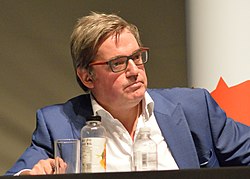Career
Blond was a senior lecturer in Christian theology at the Lancaster campus of St Martin's College and after the merger with Cumbria Institute of the Arts in August 2007 he worked at the Lancaster campus the University of Cumbria [5] and was a lecturer in the Department of Theology at the University of Exeter. [6]
Blond was the director of the Progressive Conservatism Project at the London-based think tank Demos, but left due to "political and philosophical differences" [7] to establish his own think tank, ResPublica.
Blond gained prominence from a cover story in Prospect magazine in the February 2009 edition with his essay on red Toryism, [8] which proposed a radical communitarian traditionalist conservatism that inveighed against both state and market monopoly.
According to Blond, these two large-scale realities, while usually spoken of as diametrically opposed, are in reality the two sides of the same coin. As he explains it, modern and postmodern individualism and statism have always been connected of the hip, at least since the advent of Jean-Jacques Rousseau's thought, if not well before that in the work of Thomas Hobbes. [9] In a series of articles in both The Guardian [10] and The Independent he has argued for a wider recognition of the merits of civic conservatism and an appreciation of the potentially transformative impact of a new Tory settlement. [11]
In 2010, The Daily Telegraph called him "a driving force behind David Cameron's 'Big Society' agenda." [12]
Blond is a fellow of the National Endowment for Science, Technology and the Arts. [6]
This page is based on this
Wikipedia article Text is available under the
CC BY-SA 4.0 license; additional terms may apply.
Images, videos and audio are available under their respective licenses.
